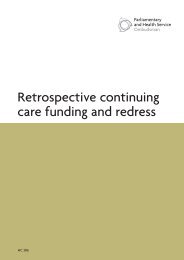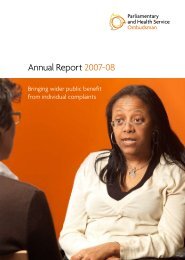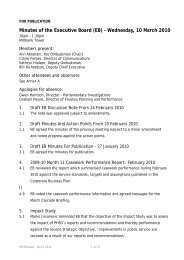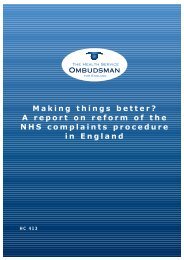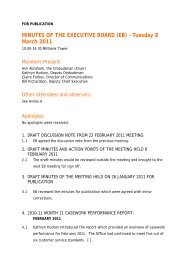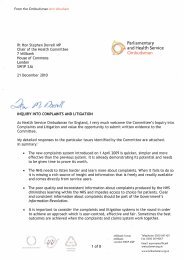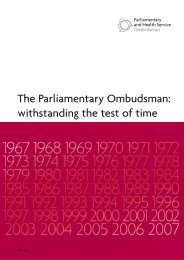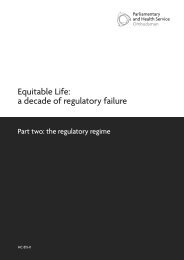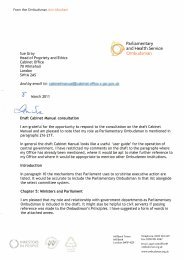Putting things right: complaints and learning from DWP - the ...
Putting things right: complaints and learning from DWP - the ...
Putting things right: complaints and learning from DWP - the ...
Create successful ePaper yourself
Turn your PDF publications into a flip-book with our unique Google optimized e-Paper software.
Mr C’s complaint about The Pension Service<br />
<strong>and</strong> Debt Management<br />
In Mr C’s case, The Pension Service’s delay in updating his aunt’s records, <strong>and</strong> delays by Debt<br />
Management, led to problems after her death. It meant that <strong>the</strong>y were not able to make a timely <strong>and</strong><br />
accurate decision about whe<strong>the</strong>r she had been overpaid <strong>and</strong> caused Mr C to incur avoidable legal<br />
costs.<br />
Background to <strong>the</strong> complaint<br />
In October 1999 Miss E’s income support claim<br />
started. Her nephew, Mr C, regularly sent copies<br />
of her bank statements to <strong>the</strong> <strong>the</strong>n Benefits<br />
Agency to show <strong>the</strong> changes in Miss E’s capital.<br />
In August 2002 Miss E’s file was sent to a storage<br />
centre. In December 2003 <strong>the</strong> file was requested<br />
by an office of The Pension Service, but it was not<br />
returned subsequently to storage. The Pension<br />
Service were later unable to identify who had<br />
requested <strong>the</strong> file <strong>and</strong> where it had been sent.<br />
Miss E died in October 2004, <strong>and</strong> in July 2005<br />
<strong>the</strong> solicitors looking after her estate told Mr C<br />
that <strong>the</strong>y expected to be able to distribute <strong>the</strong><br />
estate soon. Debt Management <strong>the</strong>n wrote to <strong>the</strong><br />
solicitors advising <strong>the</strong>m not to distribute <strong>the</strong> estate<br />
as <strong>the</strong>re might have been a benefit overpayment.<br />
In August <strong>and</strong> September Mr C contacted Debt<br />
Management <strong>and</strong> provided fur<strong>the</strong>r information. In<br />
October Debt Management requested information<br />
<strong>from</strong> <strong>the</strong> solicitors about Miss E’s bank accounts<br />
<strong>and</strong> shares.<br />
In March 2006 Debt Management <strong>and</strong> <strong>the</strong> solicitors<br />
agreed that, as not all <strong>the</strong> information requested<br />
could be obtained, <strong>the</strong>y would use <strong>the</strong> amounts<br />
in Miss E’s accounts at <strong>the</strong> date of her death. Debt<br />
Management <strong>the</strong>n issued a decision calculating <strong>the</strong><br />
overpaid benefit at £2,918.30. In April Mr C wrote to<br />
Debt Management <strong>and</strong> asked to appeal (his letter<br />
was filed in error <strong>and</strong> not dealt with). Between May<br />
<strong>and</strong> July Mr C chased progress by telephone <strong>and</strong><br />
letter. In July Debt Management replied, noted that<br />
Mr C wished to appeal, said that recovery of <strong>the</strong><br />
overpayment would be suspended until <strong>the</strong> issues<br />
were resolved, provided some fur<strong>the</strong>r information<br />
in response to Mr C’s earlier letter <strong>and</strong> apologised<br />
for <strong>the</strong> lack of an earlier reply. Between July <strong>and</strong><br />
September Debt Management <strong>and</strong> Mr C exchanged<br />
fur<strong>the</strong>r correspondence. Mr C believed, despite<br />
<strong>the</strong> March 2006 agreement, that <strong>the</strong> exact figures<br />
should be used <strong>and</strong> offered to provide relevant<br />
information.<br />
In October 2006 Debt Management wrote to <strong>the</strong><br />
solicitors requesting payment of £2,918.30 (this<br />
letter was attributed to a computer error). Later<br />
that month Debt Management wrote to Mr C<br />
with a revised overpayment calculation of £518.80<br />
<strong>and</strong> asked for his comments before a formal<br />
decision was made. Mr C discussed <strong>the</strong> matter<br />
by telephone with Debt Management <strong>and</strong> <strong>the</strong><br />
decision was <strong>the</strong>n sent to Mr C (despite a request<br />
that it go to <strong>the</strong> solicitors) without <strong>the</strong> supporting<br />
calculations <strong>and</strong> schedule of assets. In November<br />
Debt Management apologised for <strong>the</strong> earlier<br />
omission, <strong>and</strong> provided <strong>the</strong> missing information.<br />
The solicitors subsequently made <strong>the</strong> repayment of<br />
£518.80.<br />
In June 2007 an appeal tribunal decided that <strong>the</strong>re<br />
was no recoverable overpayment due, as <strong>DWP</strong> had<br />
not produced any evidence to establish that Mr C<br />
had failed to make <strong>the</strong> disclosure (about Miss E’s<br />
assets) that <strong>the</strong>y required.<br />
36 <strong>Putting</strong> <strong>things</strong> <strong>right</strong>: <strong>complaints</strong> <strong>and</strong> <strong>learning</strong> <strong>from</strong> <strong>DWP</strong> | March 2009



